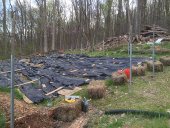posted 10 years ago
I'm wondering about an alternate strategy for weed / covercrop management, and want to know if I am missing something. I have always heard that you should weed or mulch your gardens because weeds will compete for (1) sunlight, (2) water, and (3) nutrients. I think that there might actually be important benefits from "weeds" in each of these categories, and that the competition during the growing season could be easily managed in favor of your desired plants. So no pulling weeds, and no mulch to prevent weeds, but downright encouraging them as a perpetual cover crop.
(Even though I think they might be helpful, for convenience I'll keep calling this random hodgepodge of plants "weeds".)
1. Sunlight. If you kept weeds trimmed so they were shorter than your desired crop, they would not compete for sunlight. However, if they are kept short, they would still provide shade for the soil, which would help retain moisture. In addition, if you de chop-and-drop, you've got additional mulch during the growing season to further assist with moisture retention.
2. Water. As you trim the weeds, they would have root dieback, and after decomposition of the roots you have soil with more organic material and more structure, to better hold water. In addition, as mentioned above, there are other benefits weeds could have for water retention. With no-till strategy, the continuous presence of weeds would help the soil improve more quickly than just garden plants alternated with cover crops alone.
3. Nutrients. If you are doing chop-and-drop with the weeds, they will not be removing any nutrients from the cycle of your garden -- just tying some of them up. If you have adequate mineral etc. nutrients this will not be a problem -- and the fact that you essentially have a continuous cover crop will significantly help the tilth of your soil, and if you've got nitrogen fixers like clover or legumes as weeds, they are actually fertilizing the soil.
Am I missing something, or is this worth a shot?

 1
1


















 1
1








 I like the radish suggestion.
I like the radish suggestion.




 2
2




 1
1









